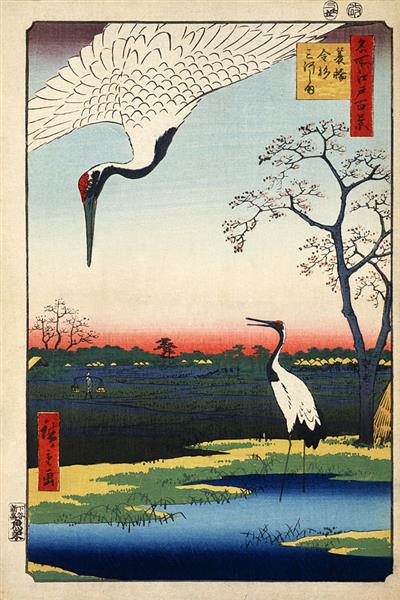Description
The work “102. Minowa - Kanasugi Y Mikawashima” by Utagawa Hiroshige, created in 1857, exemplifies the artist's mastery in creating landscapes that combine deep emotion with a naturalistic representation. Hiroshige, one of the last great masters of ukiyo-e, the art of Japanese woodblock printing, is known for his ability to capture the essence of his surroundings, transforming everyday beauty into a visual and emotional experience.
The composition of this work is notable for its elegant balance and harmony. Hiroshige employs an industrial arrangement that invites the viewer to traverse the landscape: from the foreground, where lush flora is presented, to the background, where soft hills are outlined. This play of perspectives not only creates depth but also establishes a visual narrative. The different layers of the work convey a sense of distance and the passage of time, fundamental in Japanese landscape art.
Regarding color, Hiroshige uses a delicate and subtle palette, dominated by greens and blues that evoke the calmness and serenity of the Japanese landscape. The soft tones intertwine with more intense touches that enhance certain elements, suggesting variations in light and atmosphere. This chromatic approach not only achieves an aesthetic visual effect but also reflects the symbolism associated with nature, a central concept in Japanese thought, where each hue can be interpreted as a reflection of the emotional state of the environment.
The characters in this painting are, in fact, subtle yet present. A group of tiny figures, seemingly moving along a winding path, adds a sense of scale to the landscape and suggests an intimate connection between humans and nature. This inclusion, characteristic of many of his works, speaks to the interaction between everyday life and the natural elements surrounding individuals in Japan, emphasizing a focus on the simple and ephemeral nature of existence.
The historical context of Hiroshige also enriches the interpretation of this work. In a period of transformation and modernization in Japan, his art becomes a refuge and a celebration of the traditional landscape. Hiroshige's works served as inspiration not only for his contemporaries but also for later generations of artists, both in Japan and the West. This link between nature, humanity, and the urban landscape reflects a specific time in art history when ukiyo-e was beginning to be recognized internationally.
Moreover, Hiroshige's style, with its focus on detail and innovative use of perspective and colors, establishes a dialogue with other contemporary artists, such as Katsushika Hokusai. Both artists shared the desire to represent the beauty of nature, though each with their uniqueness and personal vision.
“102. Minowa - Kanasugi Y Mikawashima” is, therefore, a fascinating representation of Hiroshige's ability to transform everyday realities into sublime art. His skill in balancing meticulous detail with a broader visual narrative invites the viewer not only to contemplate the painting but to immerse themselves in the history and feeling it evokes. This work is a testament to Hiroshige's legacy, which endures as an icon of Japanese aesthetics and a tribute to the consultative landscape of his time.
KUADROS ©, a famous painting on your wall.
Hand-made oil painting reproductions, with the quality of professional artists and the distinctive seal of KUADROS ©.
Reproduction service of paintings with a satisfaction guarantee. If you are not completely satisfied with the replica of your painting, we will refund 100% of your money.

